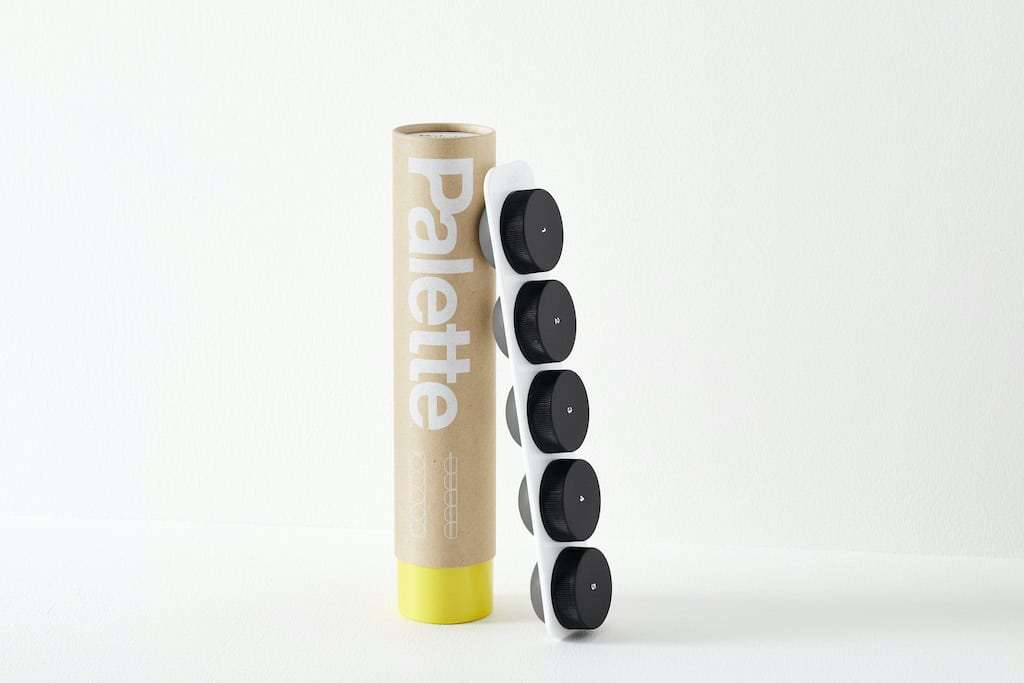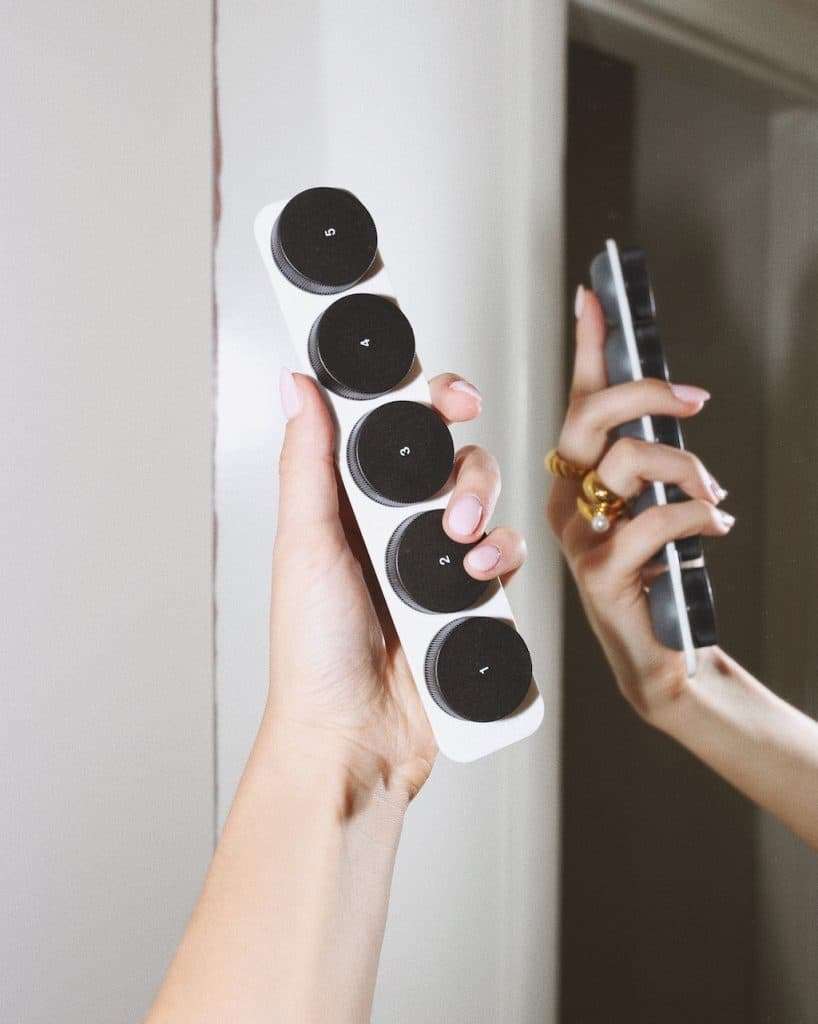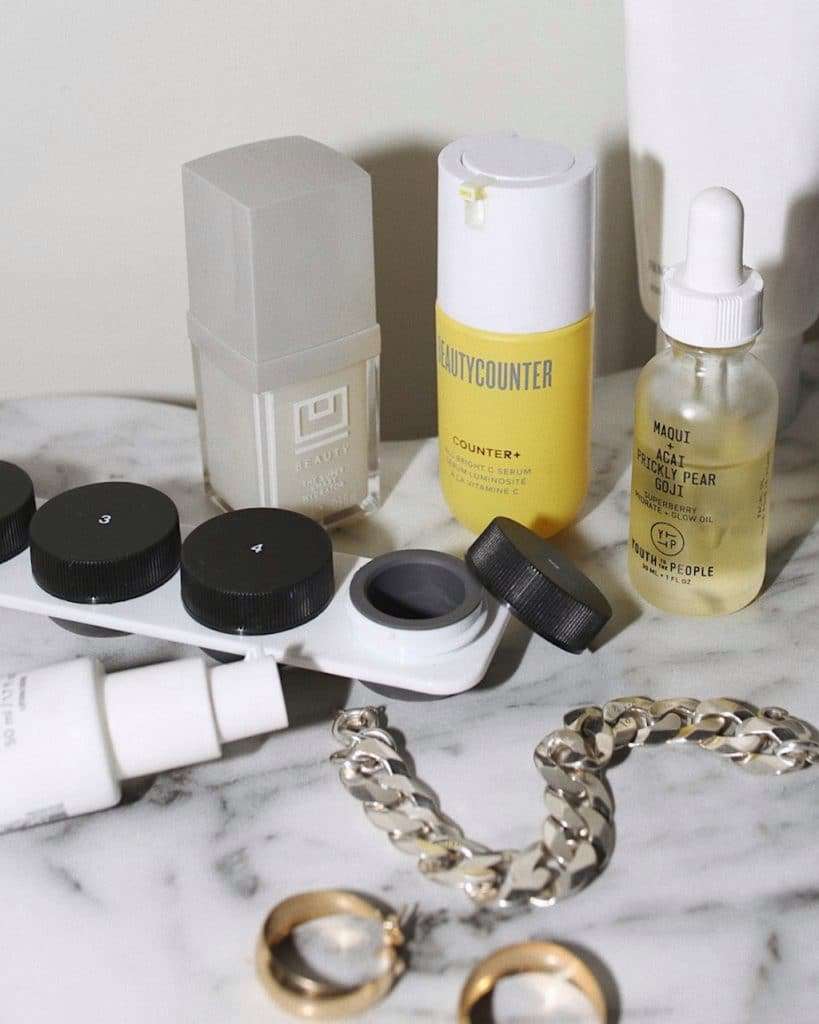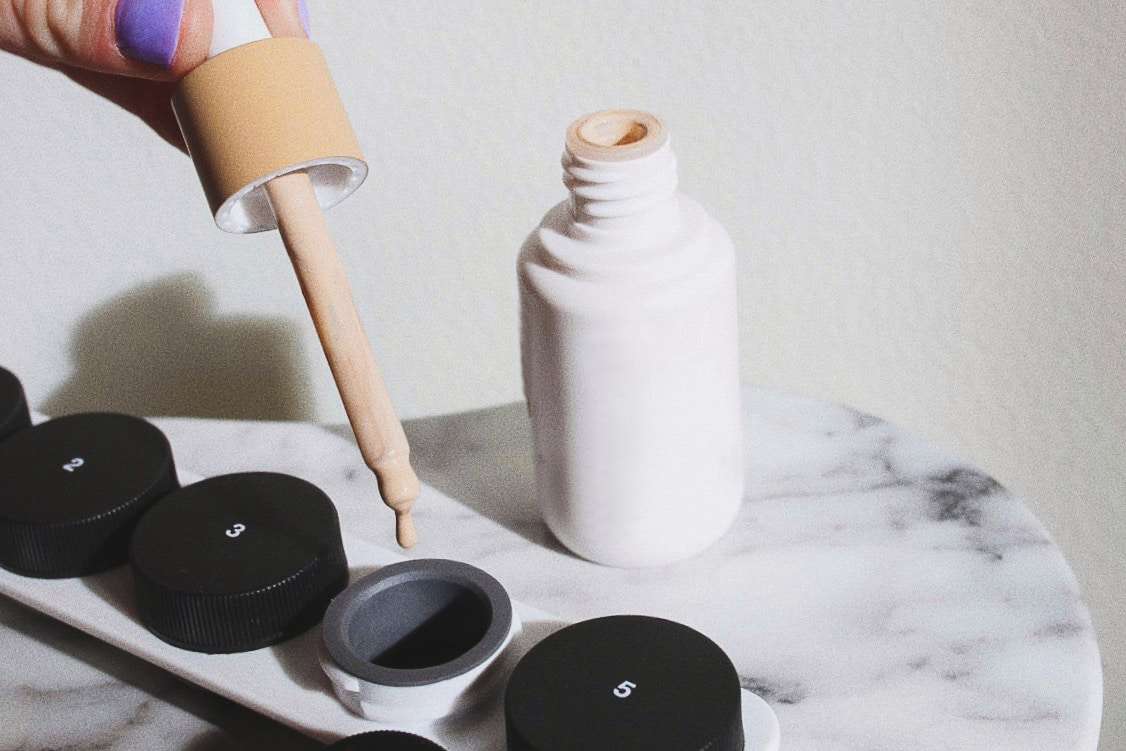
Travel more sustainably by leaving the travel-sized personal care products out of our suitcase and taking the eco-friendly refillable Palette instead.
The beauty industry is enormous; it’s valued at more than $500 billion. And the travel-sized industry isn’t a small part of that. Not only is it big business for beauty brands, but it also creates hundreds of millions of travel-sized plastic bottles and containers every year. In other words: it makes a lot of waste. Reusable, refillable brand Palette by Pak has solved a surprisingly big part of the problem: travel-sized personal care products.
Palette is the brainchild of Kate Westad, a lawyer-turned-entrepreneur and mother of four, who experienced something most anyone who’s ever traveled has. In 2019, she was packing for a trip and became inundated by all the personal care items — especially the travel-sized ones. Nothing screams waste more than single-use travel products. Packing for a trip to Paris, Westad was shocked at how much space all of the plastic products took up in her suitcase.
With our momentous plastic pollution problem no longer something she could ignore, it became an obsession for Westad. A lightbulb went off. “The average frequent traveler is taking as many as 5-10 single-use travel-size products on a trip 3-6 times a year,” Westad tells Ethos.

“You can see how quickly that adds up. That person is also spending on average about $50 or more on prestige or $25 or more on masstige beauty skincare travel size sets or mini skincare products per trip to mimic their skincare routine on-the-go. While beauty brands and retailers have also traditionally used mini and travel-size as cute and fun sampling programs, what most people don’t realize is that they’re paying primarily for product packaging not the product! And the kicker and reality is that the single-use travel-size packaging is not getting recycled,” she says.
Travel’s big plastic problem
According to the United Nations, we produce more than 300 million tonnes of plastic annually across the globe. Single-use plastic dominates this category. Since the 1950s, we’ve seen a bigger spike in plastic production than in any other material. And as the volume has increased, the quality has drastically decreased. Nearly all plastic — 99 percent — is made from fossil fuel-based sources such as oil, natural gas, and coal. The UN estimates that by 2050, plastic could account for 20 percent of the world’s total oil consumption.
And recycling is largely a myth. The UN says that only nine percent of all plastic waste ever produced has been recycled. Nearly 80 percent of all plastic is in landfills, contributing to toxic leachate and pollution, and our growing climate change problem.
One of the biggest victims of our plastic problem is the world’s oceans. More than eight million tonnes of plastic waste enter the oceans every year, contaminating the food chain and poisoning billions of marine animals. The plastic also changes the ocean’s pH, making it more difficult for the oceans to sequester carbon — a core function in keeping global temperatures down.

“What’s even crazier is people are spending so much time and money curating their custom skincare routines and have all their favorite full-size skincare products at their fingertips,” says Westad. She says it’s what motivated the launch of the brand’s signature product, the Original High Fiver.
“This way beauty and skincare lovers have a refillable, washable, reusable skincare beauty travel set ready to go at any moment,” she says. “You can go from full-size to on-the-go size in seconds.” She says reusable tools like Palette are the future of sustainable beauty.
The convenience myth
Travel-sized personal care products may be more convenient at a glance, but if you leave the empties in your hotel room, they’re not likely to be recycled. (What’s more, they often leak, creating a host of problems in your suitcase.) But it turns out, it’s a lot more complicated than that.
“What most people don’t realize is that most recycling facilities do not have the capability to recycle tiny plastics smaller than a credit card, Westad says. “Instead those tiny plastics head straight to the landfill. The New York Times recently reported that more than 90 percent of beauty products are not actually getting recycled and the onus is on the consumer to try to correctly recycle them. While dedicated beauty recycling programs are amazing and necessary, what’s really tricky about travel-size products is that people are bringing them to locations around the world that do not have specialized recycling programs or even recycling programs at all — and leaving them behind.”
This also means that because of their small size, empty travel-size products are more likely to pass into waterways and our oceans. It’s a core reason New York and California have both banned single-use travel-size options in hotels. The rule takes effect in 2023. Westad says consumers are ready to take more responsibility for the planet. “They are not just paying attention, they are the ones who are making this shift possible,” she says.
“The most electrifying and exciting thing is happening with consumer demand for sustainable goods right now. People want sustainable purpose-driven products,” she says. “There has never been a more ripe moment for responsible brands to meet conscious consumers in the marketplace.”
Westad has data on her side. Statistics show a growing number of consumers, particularly Millennials and Gen-Z, want products that are better for the planet. A recent poll found that they’re willing to pay a premium for products that are made or sourced sustainably and ethically. Westad agrees. “Most will even say it’s now table stakes,” she says.

For a mission-driven startup, that consumer-supported momentum means everything, particularly as the planet is pushing toward a breaking point.
“It truly was something that just emerged to me from the ether, and the more I thought about it, the more obsessed I became with the idea of a washable, reusable, and refillable smart beauty tool,” Westad says. “The more I learned and the more I became educated that I had been wish-cycling a small mountain of travel-size cosmetic, beauty, and personal care products during my adulthood and how single-use tiny plastics were not getting recycled—it just became something I had to do.”
Beauty reusables: the original High Fiver
The Original High Fiver is patented and pending and despite launching just before the pandemic, the feedback has been highly supportive, says Westad. “To see our story being told on a deeper sustainability level as Covid emerged and to see the traction with customers shows that there is a strong market desire for sustainability, reusability, refillability and circularity — even in the midst of travel restrictions,” she says.
“To show continued deep interest in the story of unrecycled travel-size products and discussing how we use a sustainable shipping system with our recycled paper tubes as well as using recycled plastic, medical grade materials and avoiding sustainable pitfalls like magnets and unnecessary metal—all while eliminating waste—we have felt so seen and so embraced as a brand,” Westad says.
And there’s more to come in the reusable, refillable, and sustainable space for Palette.
“I have a huge vision for Palette and many innovative product lines planned,” Westad says. “What I can say is that all of our future products will be launched very thoughtfully and have some form of intellectual property. We have listened very closely to what our customers are saying and all the feedback that they’re giving us is invaluable and it will be a huge driver in determining which product line is launched next,” she says.
“This is just the beginning for Palette, Westad says. “It is a very exciting time for us.”
Shop Palette now.
Related on Ethos:


